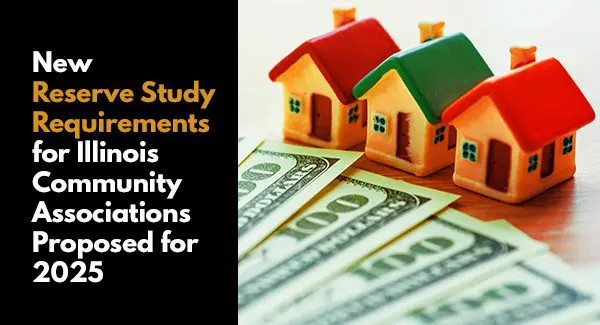- Community Associations, Legal Updates, Board Member 101, Finances
- Illinois
Illinois House Bill 0220 (HB0220) is a legislative proposal that amends both the Common Interest Community Association Act and the Condominium Property Act. The bill specifically requires that:
- Any Illinois condominium, homeowner (HOA), or townhome community association
- With major shared components or significant infrastructure
- Which has had a reserve study conducted on or after January 1, 2020
- Must have an updated reserve study conducted within five years after the initial study and at least every five years thereafter.
The bill outlines the requirements for these reserve studies, ensuring that associations regularly assess and plan for the maintenance and repair of shared infrastructure.
Defining Shared Infrastructure
Shared infrastructure in the context of community associations typically refers to facilities and systems that are jointly used and maintained by the members of a community. Examples of shared infrastructure include:
- Roads and streets: Private roads within the community, parking lots, and sidewalks are maintained by the association for the benefit of all residents.
- Buildings and structures: This includes clubhouses, community centers, shared garages, or other communal buildings that are used by all members of the community.
- Recreational facilities: Pools, tennis courts, playgrounds, fitness centers, and parks that are available for the use of all residents.
- Elevators and hallways: Elevators, stairways, hallways, and other common areas are shared infrastructure that requires maintenance in condominiums or high-rise buildings.
Reserve Study in Focus
A community association reserve study is an evaluation of the physical components of a property (ex. roofs, elevators, mechanical equipment) to determine their remaining useful life and the estimated costs for their repair or replacement.
In the wake of the Surfside, FL condominium collapse, the importance of regular reserve studies has been underscored, as they may help associations avoid deferred maintenance that could lead to potential, and catastrophic, structural failures. Additionally, Fannie Mae’s growing ineligible list has significantly impacted financing options for associations with poor reserve funding.
Reserve studies can be a beneficial and proactive tool for maintaining the community association’s financial health and avoiding the need for sudden, large special assessments. These studies are designed to ensure that adequate funds are available to maintain and repair shared infrastructure, safeguarding residents and the property.
Status and Effective Date
As of the most recent updates, Illinois House Bill 0220 (HB0220) has not yet been signed by the Illinois Governor, JB Pritzker. The bill has been referred to the Senate Assignments Committee as of June 26, 2024 and is still pending further action before it can be presented to the governor for signing. If signed into law, it would take effect on January 1, 2025.
Legal Resource
Along with this legislative proposal, Section 19 of the Illinois Condominium Property Act was also recently amended to provide that Board makes the association’s reserve study available for inspection, examination, and copying.
Do not hesitate to contact our law firm if you are Illinois community association board member, property manager, or community association leader with questions about your association’s assessment collection policies, special assessments, and maintenance responsibilities.
Please call 855-537-0500 or visit www.ksnlaw.com. Since 1983, KSN has been a legal resource for condominium, homeowner, and townhome associations. Additionally, we represent clients in real estate transactions, collections, landlord/tenant issues, and property tax appeals. We represent thousands of clients and community associations throughout the US with offices in several states including Florida, Illinois, Indiana, and Wisconsin.
Please note the material contained in this article is for educational and informational purposes only and does not constitute legal advice. No attorney-client relationship is established by your review or receipt of the information contained in this article. You should not act on the information discussed in this article without first obtaining legal advice from an attorney duly licensed to practice law in your State. While KSN has made every effort to include up-to-date information in this article, the law can change quickly. Accordingly, please understand that information discussed in this article may not yet reflect the most recent legal developments. Material is not guaranteed to be correct, complete, or up to date. KSN reserves the right to revise or update the information and statements of law discussed in the article law at any time, without notice, and disclaims any liability for your use of information or statements of law discussed on the article, or the accessibility of the article generally. This article may be considered advertising in some jurisdictions under applicable law/s and/or ethical rules/regulations. © 2024 Kovitz Shifrin Nesbit, A Professional Corporation.



